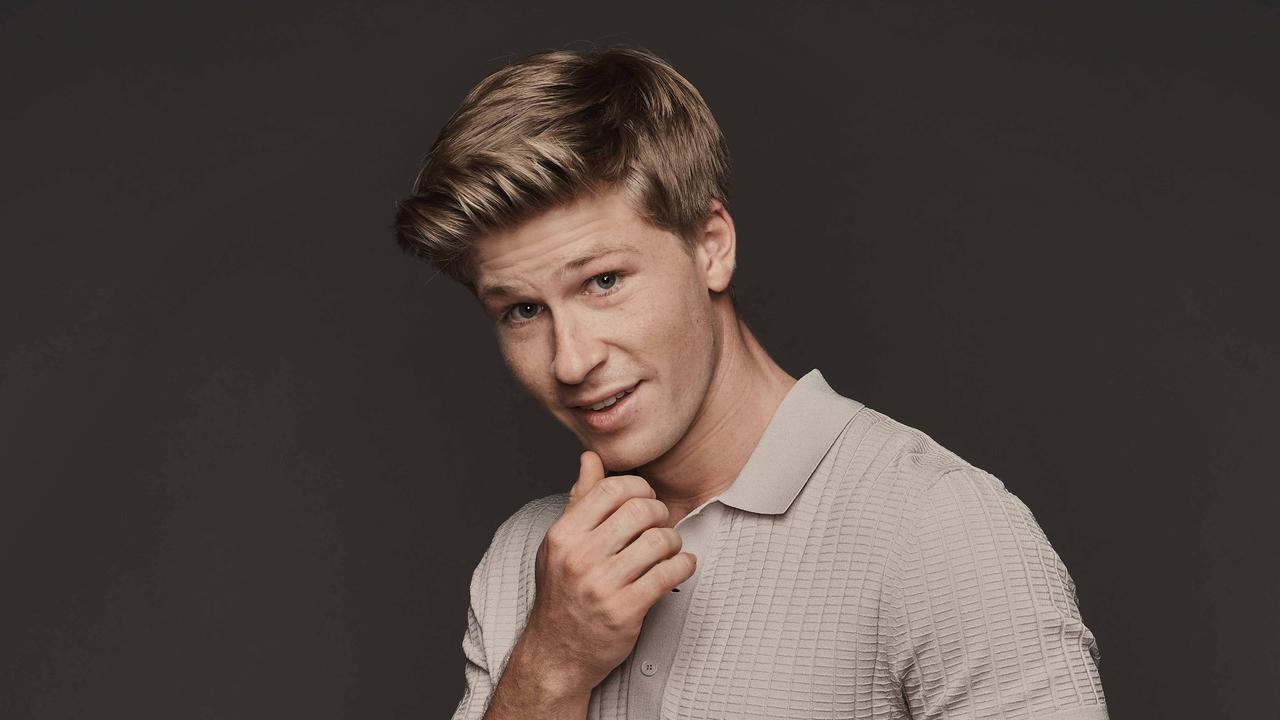Karen Webb is making her mark as NSW’s first female police commissioner
Karen Webb opens up on her life and those experiences that have defined her both as a person and an officer as she trailblazed her way to the top of the NSW Police Force.
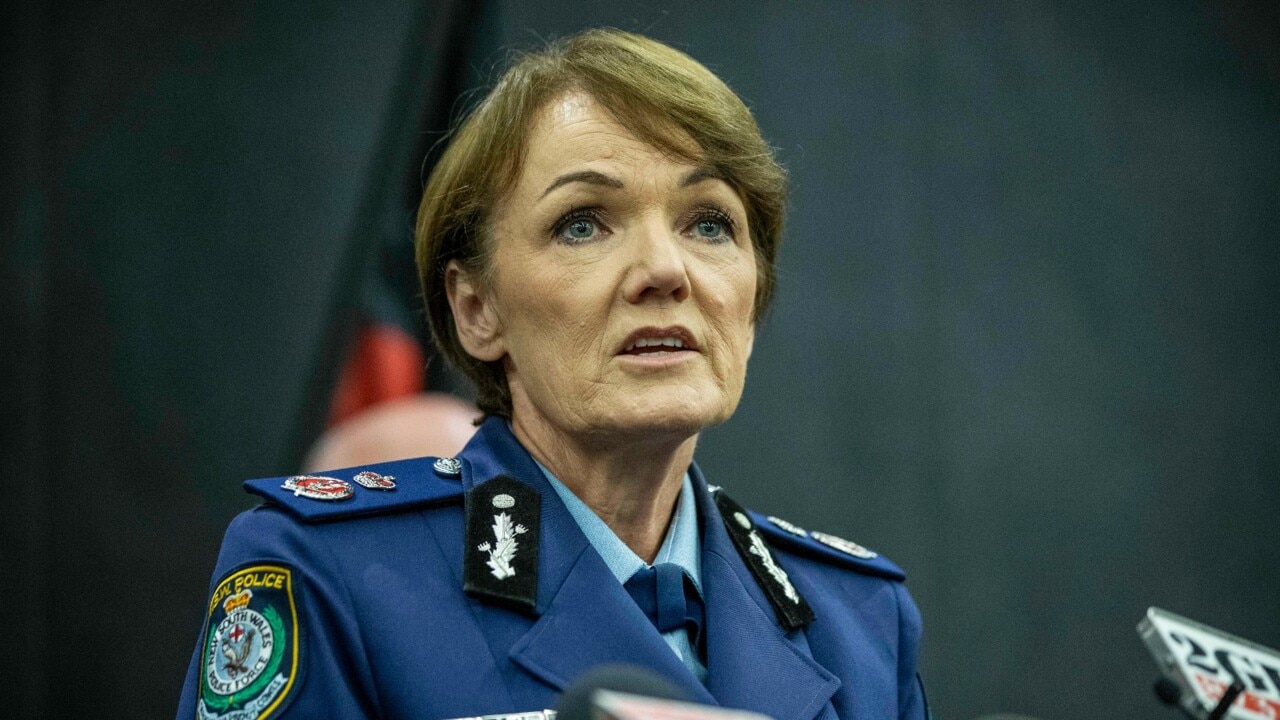
Sydney Weekend
Don't miss out on the headlines from Sydney Weekend. Followed categories will be added to My News.
The morning after learning she was to become NSW’s next – and first female – police commissioner, Karen Webb was smuggled into Parliament House in scenes reminiscent of a classic spy movie.
“I was literally in the back seat, tinted windows, with a jacket over me,” Webb recalls of that day in November 2021.
Premier Dominic Perrottet didn’t want any leaks. Webb’s appointment was to be the state’s best kept secret until after his emergency cabinet meeting.
“We were whisked into the basement of Parliament House so no one knew who had got the job, then straight into the Premier’s office where we waited until it was time for the announcement,” Webb says.
She had received a phone call just the night before confirming she was the Premier’s pick for the top job.
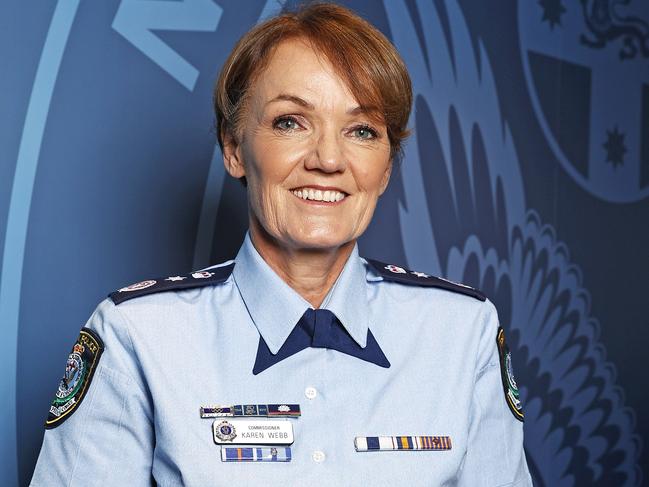
The quiet achiever had stared down two fierce competitors to earn his trust as the right person to lead the state’s 18,000 police officers and make history in the process.
The appointment was not based on gender, Perrottet said. He was confident in Webb’s ability and thanked the “high-calibre” contenders – Mick Willing and Mal Lanyon.
The three-way battle to lead NSW’s police had played out amid much publicity in the months following Mick Fuller’s announcement he intended to resign after four years at the helm.
Considered a frontrunner, Lanyon’s chances of success seemed to slip away after a parliamentary inquiry heard allegations of a bizarre late-night incident in Goulburn last year in which he allegedly told a paramedic trying to help him to f**k off before insisting on calling NSW Ambulance CEO Dominic Morgan.
Lanyon said he had been “unaware” he had caused “any offence” to ambulance officers.
“I have the greatest respect for all officers and the work they do,” he said.
In a statement, police said Lanyon would be taking steps to personally apologise to the crews that had attended.
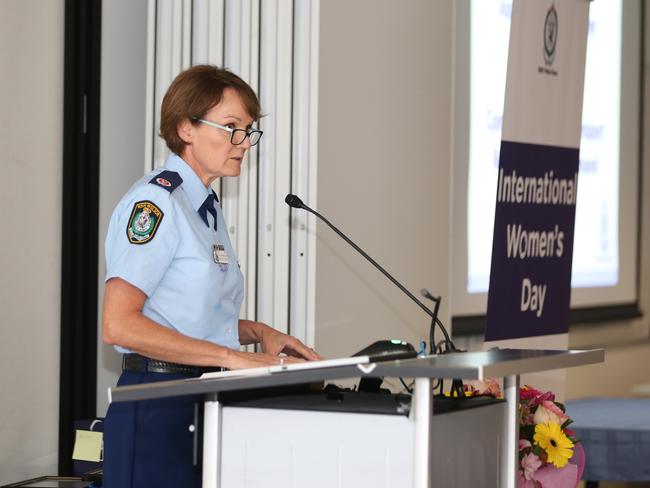
And then there were two.
Webb ultimately beat Willing – a high-profile contender who had regularly addressed the state at the daily Covid-19 press conferences during the 2020 and 2021 lockdowns and before that during the Black Summer bushfires.
He had also headed a local area command, homicide squad, counter terrorism and special tactics, among many other sections.
In January, a week before she was officially sworn in, Webb signalled that she would run the force her own way, informing Willing his services were no longer required.
She has remained tight-lipped about what transpired in that phone call to Willing, later telling journalists: “I don’t want to get into someone’s employment situation.”
“People come and go throughout this organisation quite often, so the employment situation is not something that I talk about,” she said.
“My job now is to get on with running the organisation, forming my team, and that’s exactly what I intend to do.”
Next she made sweeping changes to the force’s hierarchy, appointing two new deputy commissioners, two new assistant commissioners and moving more than a dozen senior officers from their commands.
The changes were based on personal skills and the needs of the organisation and made in full consultation with her executive team, she says.
“I’ve always been one to not accept the way things are done if there’s an opportunity to do things better.”
A NEW DIRECTION
Webb’s appointment, and those swift changes to her senior team, signalled a dramatic shift from the rule of Fuller, a well-connected leader whose long list of high-flying contacts has landed him a job in a major consultancy firm since retiring from the NSW Police Force.
Fuller had taken over from Andrew Scipione in 2017 when NSW’s police hierarchy was embroiled in a civil war, with a public brawl between top deputies Nick Kaldas and Cath Burn playing out in a parliamentary inquiry.
He unified the executive much quicker than many thought possible and immediately went to work putting his mark on the job.
With her unassuming, humble nature, Webb seems unlikely to replicate the style of her predecessor, who was close to former premier Gladys Berejiklian, NRL and horse racing supremo Peter V’landys, and held a regular weekly spot on breakfast radio.
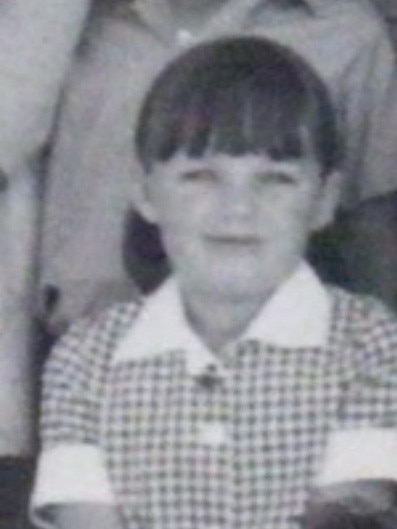
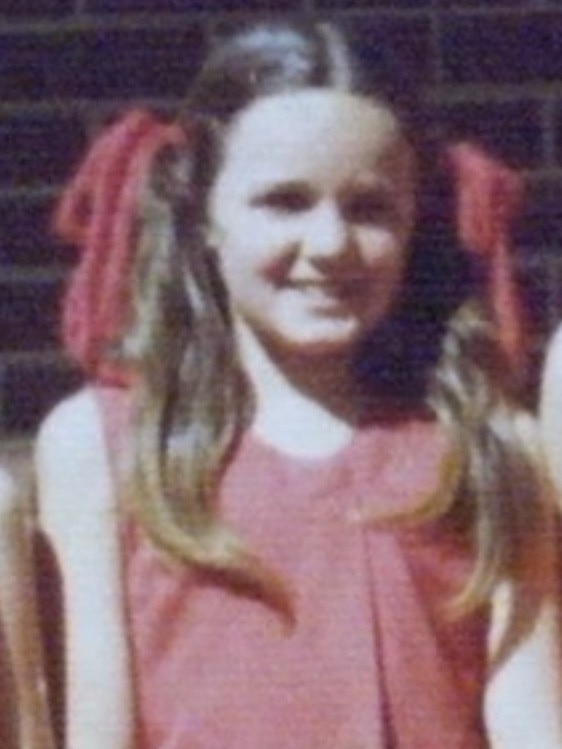
The mother-of-two, who was raised in the small, southwestern NSW town of Boorowa, brings a more understated style of leadership.
Unfazed by the buzz around her history-making appointment, Webb prefers to make her mark as the commissioner who looks after her people and better protects victims.
In a candid interview with Sydney Weekend, Webb reveals she has had her fair share of heartbreak – her “battle scars” that have shaped the way she approaches her role.
“I’m a mum. I’ve juggled part time work, mortgages, all those pressures that normal people have,” she says.
“I’ve lost a brother to suicide, a father to cancer, I’m just real like the rest of us.
“It’s not like I’ve had this perfect life, I’ve got all these battle scars. It’s what happens to you that helps you empathise with other people and what they are going through.”
Webb lost her father and brother at pivotal times in her life that would otherwise have been filled with joy.
“My brother died 25 years ago, three days before my son was born,” Webb says.
“I was overdue with Lachie, my mum and dad were home in Gerringong with me for the birth of their first grandson and we got a phone call to say my brother had been found. So I sent Mum and Dad home to Boorowa.
“I knew I had to be induced on the Monday morning so I packed up and went across to Mum and Dad, turned up at Young hospital and said, ‘I’m having this baby’.
“Two days later I had to leave my baby in the hospital to go to my brother’s funeral.”
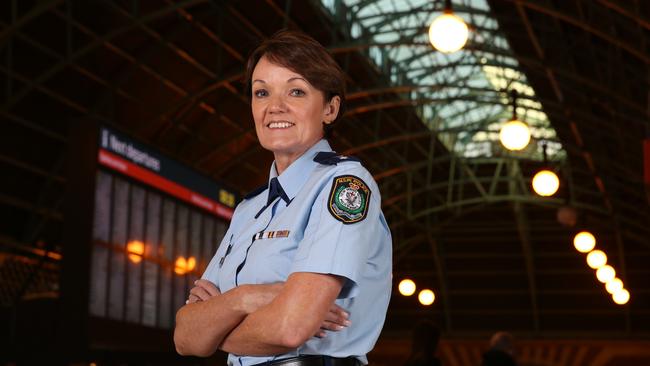
Two years later, Webb was pregnant with her second son as her dad was battling cancer.
“My dad was really sick, he was only given three to six months. Tom was born in Shellharbour Hospital and probably eight hours later I bundled him in the car to take him home so Dad could meet him.
“It’s another one of those moments I guess. We went through a lot.”
Webb navigated her grief with the support of her friends and family.
“I say to people family is the most important thing. This is an important job but it’s the family who supports you through it.”
Lachie, now 25, and Tom, 23, keep their mum grounded.
“It won’t matter where I am, what I’m doing, they will still text me and ask ‘where is this, where is that?’ she says.
“They say to me, you’re the commissioner but you’re still our mum.
“I tell the police officers on the ground your family is the most important thing you have. I remember when people tell me about a family member and I check in, because it’s important to our people.”
A COMMUNITY COP
Webb chose a career in policing after an encounter with the local cop in her hometown.
“It was Australia Day 1982 and, as you would expect, it was a hot day with not much activity,” she recalls.
“As you did in country towns in those days, you went to the local police station to get your driver’s licence.
“On that day it was Senior Constable John Stone. John was everything you believe a good country cop to be – respectful, firm but fair, and, importantly, he lived by and promoted the values of the NSW Police Force.
“John was, in my opinion, a true community leader. I was so impressed by John that day, coupled with a recruitment pamphlet on the counter, that at that moment I decided I wanted to join the NSW Police.”
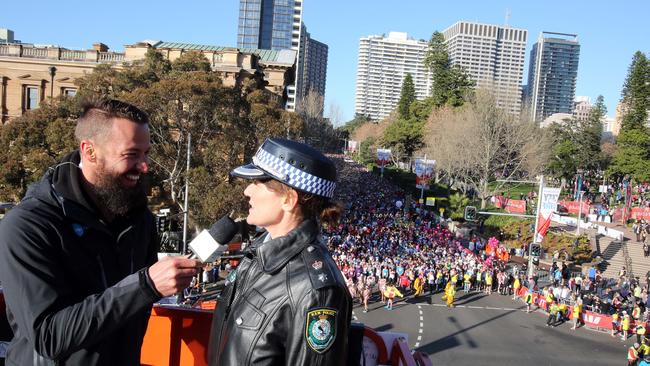
Forty years later she returned to Boorowa, with Premier Perrottet and Governor Margaret Beazley by her side, the police band in full swing and police choppers flying overhead, to tell the children at Boorowa Central School that they too could achieve anything.
When she joined the force she had no intention of becoming commissioner though she “never discounted it either”.
“I can do the job and I can make a difference. I bring calm under pressure and I believe people are important, the police workforce of 22,000 people is important, the community is important and the victims are important,” she says.
“But I also have that hard edge when I need it.”
Like any cop on the street who has worked in general duties and as a detective in the drug unit, the young Webb quickly got used to “that shiver up your spine” when faced with impending danger.
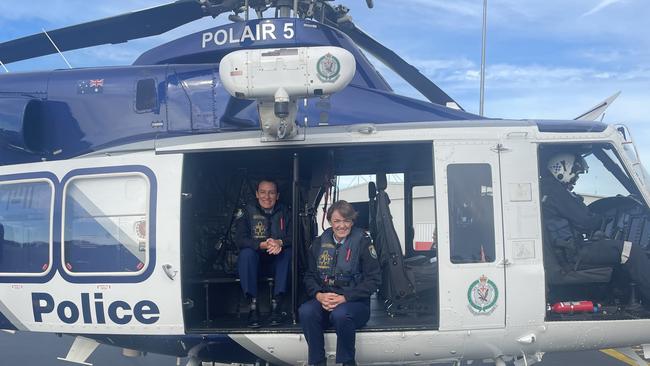
But it was her time in the child mistreatment unit that had the most profound impact.
“I worked in child abuse before I had kids. And back then it was busy every day. Day in, day out, you’d go out in the car to people’s homes and hear the same sorts of harrowing stories. It was important work that needed to be done. It wasn’t until I had my kids and I was back operational that I thought, ‘I don't know how I could have done that now I have children.’ But people do.
“I remember just talking to kids as young as three, trying to get statements from young children. It’s hard, it’s not the best evidence, it’s uncorroborated. You can feel a bit useless because you can’t get a prosecution.
“Then you get a card saying ‘thanks for helping me’ from a family when you don’t think you’ve helped at all. That’s rewarding, even though you haven’t done as much as you would have liked to have done.”
STAYING TRUE
With seven months under her belt as commissioner, Webb is not surprised at the suggestion she’s a mystery to most given her policing career and personal life has not played out in public thus far.
“I think that’s because I just get in and get the job done,” she says.
“It’s been tumultuous getting the troops settled and each day is different and has its challenges, but each day is different whether you’re a constable or the commissioner.”
She stays true to her “authentic self”, putting the “good” of the organisation before “personalities”.
“You can’t have a facade that you’re someone that you’re not because you can’t live that,” she says.
“It never works, you can’t maintain that.”
Today a large part of Webb’s focus inevitably has to be taking a stand against the violence perpetrated by Sydney’s feuding crime gangs, who shun the law and shoot each other in the streets.
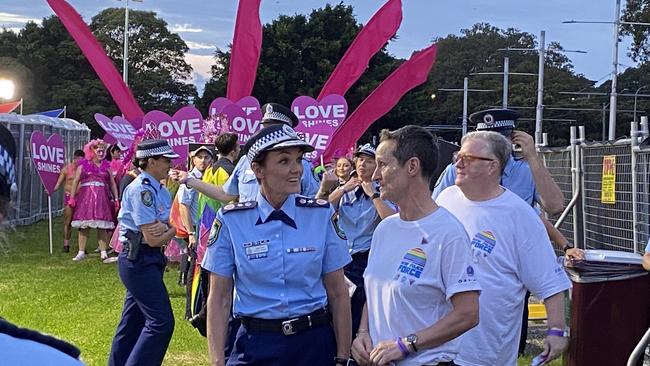
She believes she has the right people in the right jobs to “lock up crooks” and dismantle their empires, and her role is about getting the right balance and spread of resources to address all aspects of community safety. Looking to the future, other major focuses will be victims of sexual assault and domestic violence.
“We can’t do it alone, we have to work with everyone in this space. But inside the organisation, the better we are at first contact with the victim, the way we conduct ourselves and treat that person at that point in time, the better we treat the people,” Webb says.
“The more time we put in the better chance we have at keeping the victim engaged through the court process.
“There are 91,000 AVOs in existence at any one time, that’s including interim and others.
“We get 140,000 calls per year for domestic violence assistance, that’s 400 a day. It’s a big problem so how do you prioritise the AVOs where you’ve got high-risk victims and high-risk offenders.
“Sexual assault is another (big problem), and it’s sometimes connected to domestic violence. Within the sexual assault space I am lobbying to change the processes that protect the identity of the victim. That’s not guaranteed right now.
“We put a lot of time and effort into supporting victims and I think there is room for us all, the government too, to make some improvements to protect the victims. I would like to see more in that space.”
LEADING BY EXAMPLE
Webb’s success will largely be judged by the people she governs.
Her chief of staff, acting Superintendent Chrissie McDonald has no doubt she is the best person for the job.
“She has a huge amount of respect. When she became commissioner, I received 180 texts in an hour saying how amazing she is,” McDonald says.
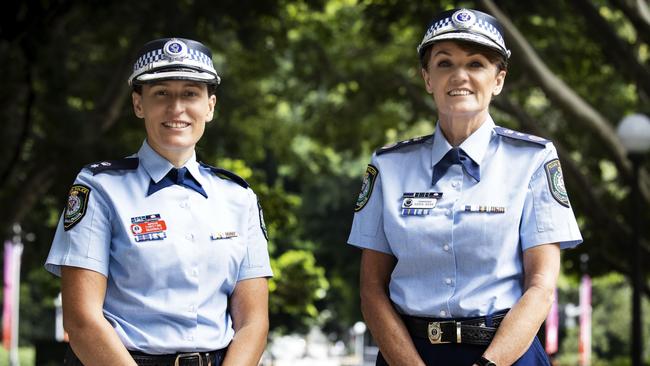
“I regularly get emails, messages and phone calls from officers, all sorts of people, saying she came up and spoke with them, and she was lovely, humble and down to earth.
“The best times are when she is in her natural police environment, at a police station interacting with her officers. She loves that.
“She often says to me just keep our heads down and work. That keeps her grounded and connected to her community. She doesn’t focus on noise, but what’s really at stake.”
McDonald first met Webb in 2018.
“She plucked me out of the blue to be operations manager with the Marine Area Command. She didn’t know me at all, and I was a fish out of water at first.
“What was a strategic move on her part, became a career defining moment for me. I stayed 16 months, way longer than I thought I would, and I loved it.
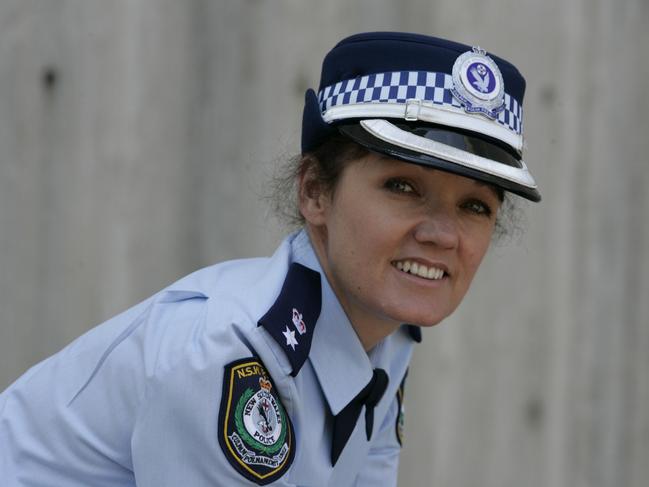
“Personally, I consider it a privilege to be able to work with not only the Commissioner of Police, but an amazing human being. She values my opinion, and I pretty well go everywhere with her. She’s someone I know. We’ve been through a lot together. Challenges like the death
of police officers, and significant restructures.
“You need people around you to work through those times – even if you’re the police commissioner.”
McDonald says Webb has a very strategic mind.
“She knows what organisations need, what teams need, and what individuals need to thrive,” McDonald says.
“She is very fair. She will bring humility and humanity to the role. She’s highly intelligent, someone who remembers absolutely everything, and she thinks into the future, but she never forgets the past.
“I would never underestimate her. I see her in meetings, and I regularly think she’s the toughest and most intelligent person in the room. Yet she sees herself as an ordinary human being, a country girl.
“She often says, ‘we’re country girls who’ve done well, and we don’t forget where we’ve come from’.”


